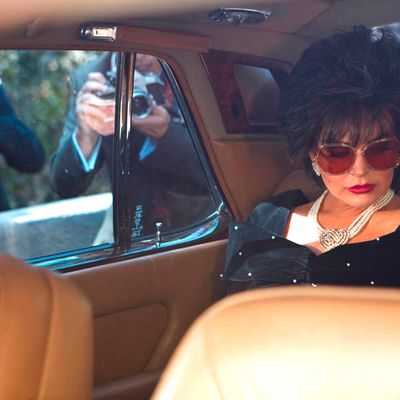
Ladies and gentlemen, behold Liz & Dick, the worst reviewed program of 2012.
This made-for-TV movie (Lifetime, Nov. 25, 9 p.m) recounts the romance of Elizabeth Taylor and Richard Burton, who had an affair on the set of Cleopatra, co-starred in the acclaimed film version of Who’s Afraid of Virginia Woolf?, and married and divorced twice. It’s told through a framing device that finds Liz (Lindsay Lohan) and Dick (Grant Bowler) being interviewed while seated against a black backdrop: talk show purgatory. The contrarian in me would love to tell you that Liz & Dick is not that bad – that it has redeeming qualities, or that it’s a parody of mediocre TV biopics.
Alas, no: it’s just bad-bad. Specifically, it’s retro-bad – a compact yet still lumbering TV biopic that, back in the day, might have starred Kate Jackson and Richard Chamberlain and been filmed on whatever Dynasty sets were available that month. I wish it had been shot a touch more cruddily; slipshod visuals would have suited its stumblebum drama better than the lush lighting, the vibrant costumes, and the period-accurate eye makeup, which makes Lindsay Lohan credible as Elizabeth Taylor if you squint and cover your ears. (I love Lohan’s raspy Janet Leigh voice, but it’s too blah and girlish.) You can’t watch Liz & Dick and say that nobody’s trying. The problem is, you can’t tell what they were thinking. Lee Holdridge’s score is pitched about right. It has two basic modes: jaunty, quasi-comedic galumphing, and a guitar-and-piano “lover’s theme” that sounds like music for a puppy to die by. It’s faintly absurd, in a good way. I wish that director Lloyd Kramer and screenwriter Christopher Monger (That’s Life) had matched it. Liz & Dick is a crushingly literal tale of A Great Love That Couldn’t Be, starring a couple too arrogant and petty to care about. This film’s Burton and Taylor are human gargoyles on the same emotional wavelength as Faye Dunaway’s Joan Crawford in Mommie Dearest, minus the volcanic madness that made her grotesquely sympathetic when she wasn’t terrorizing her moppet daughter.
In the arguments and tantrums, you glimpse a film sharper than the one you’re watching: an account of how Hollywood greed and hypocrisy turns toxic narcissists into tin-pot royals whose every wish, no matter how ridiculous or destructive, must be indulged, to provide producers with names to put on posters, and the media with a way to sell papers (and incidentally promote the stars’ movies). Liz & Dick is aware of this vicious/ridiculous cycle. There’s a scene early on where Dick complains, “Why is it so hard for us to find out where she’s dining, but the press always knows?” and his handler replies, “Because she bloody tells them, that’s why.” But it’s mostly dim-bulb awareness of the sort that a starlet might trot out on Jimmy Kimmel’s show. David Eigenberg’s Ernest Lehman – the screenwriter who adapted Who’s Afraid of Virginia Woolf? – regards Liz and Dick as if they were tortured animals who should be both pitied and feared. Like the film’s composer, he has the right attitude. Too bad the filmmakers don’t match it. The story of Elizabeth Taylor and Richard Burton is a classic with-or-without-you scenario – the kind of hopelessly mercurial love that Albert Brooks explored in his 1981 comedy Modern Romance, which includes the line, “You’ve heard of a no-win situation? Vietnam? Us?” I kept hoping for some creative spark – of camp or tragedy or poker-faced sincerity – to ignite a reaction besides derision. Liz & Dick was put on earth be laughed at, though. At its worst — which in this context means “best” — it’s a stitch.
The film shifts gears from passively bad to actively, delightfully bad when Dick’s wife Sybil (Tanya Franks) confronts him about his infidelity and screeches, “Nooo moooore LIES!!!!!” From then on, it’s hate-watch material. The Office’s Creed Bratton plays 20th Century Fox chief Darryl F. Zanuck, who brandishes a salacious news story about the cheaters and snarls, “I have a publicity department specifically so that photos like these do not, not, not get published, capiche?” The film’s highlight is probably the scene in which Taylor’s then-husband Eddie Fisher (Andy Hirsch) surprises his wife at a party with Dick, and Dick demands that she choose between them on the spot. “Here we are, two schoolboys begging for your hand,” he says. “Answer us now. Who do you love: Eddie or me?” How I wish that were a cue for a song!
The thudding expository dialogue — as if the characters are reading aloud from whatever books the screenwriter used as research — plays like placeholder material that was meant to be rewritten but wasn’t. “This was the scandal,” Liz tells the Afterlife Exit Interviewer. “Before us, they never really wrote about affairs between married people.” “We were meant for each other!” Dick yells at his much older brother/father figure Ifor Jenkins (David Hunt). “That’s what she said to Conrad Hilton, Michael Wilding, Mike Todd and Eddie bloody Fisher!” he yells back, incidentally bringing us up to speed on Elizabeth Taylor’s matrimonial history. A drunken Liz, stung by her lover, smashes a bottle against a wall, and her voice-over tells us, “I was so mad at Richard!” Thanks, movie! Whenever the action flags, you can admire the jewelry, makeup and costumes (the fur hats deserve a special fur hat Emmy). Or you can close your eyes, listen to Grant Bowler’s honey-and-whiskey baritone, and imagine you’re watching Jared Harris imitate Richard Burton to amuse Lindsay Lohan at a party.
“You look at me like you loathe me,” Dick tells Liz. “I don’t loathe you,” she clarifies. “I hate you!” It’s a thin line between loathe and hate. I don’t loathe or hate Liz & Dick. It gives me pleasure — not in the way that it’s makers intended, probably, but I’ll take it.


